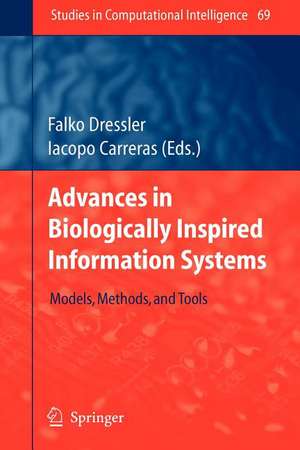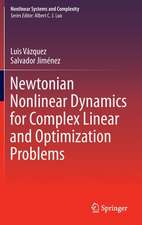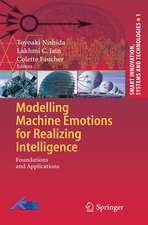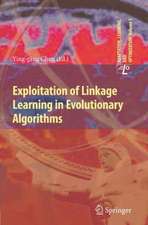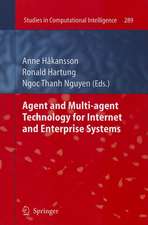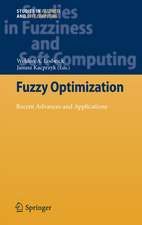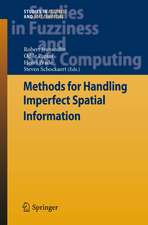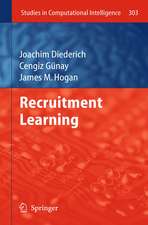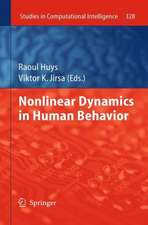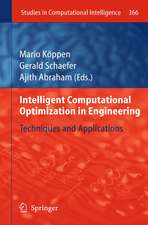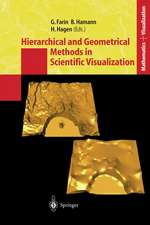Advances in Biologically Inspired Information Systems: Models, Methods, and Tools: Studies in Computational Intelligence, cartea 69
Editat de Falko Dressler, Iacopo Carrerasen Limba Engleză Paperback – 20 noi 2010
A fundamental research challenge is the design of robust decentralized computing systems that are capable of operating under changing environments and noisy input, and yet exhibit the desired behavior and response time, under constraints such as energy consumption, size, and processing power.
Biological systems are able to handle many of these challenges with an elegance and efficiency still far beyond current human artifacts. The goal is to obtain methods on how to engineer technical systems, which have similar high stability and efficiency.
With this book, we present a comprehensive overview of the most promising research directions in the area of bio-inspired computing. According to the broad spectrum addressed by the different book chapters, a rich variety of biological principles and their application to ICT systems are presented.
| Toate formatele și edițiile | Preț | Express |
|---|---|---|
| Paperback (1) | 945.47 lei 6-8 săpt. | |
| Springer Berlin, Heidelberg – 20 noi 2010 | 945.47 lei 6-8 săpt. | |
| Hardback (1) | 950.52 lei 6-8 săpt. | |
| Springer Berlin, Heidelberg – 9 iul 2007 | 950.52 lei 6-8 săpt. |
Din seria Studies in Computational Intelligence
- 20%
 Preț: 449.37 lei
Preț: 449.37 lei - 20%
 Preț: 1158.26 lei
Preț: 1158.26 lei - 20%
 Preț: 986.66 lei
Preț: 986.66 lei - 20%
 Preț: 1452.76 lei
Preț: 1452.76 lei - 20%
 Preț: 168.78 lei
Preț: 168.78 lei - 18%
 Preț: 1112.30 lei
Preț: 1112.30 lei - 20%
 Preț: 565.38 lei
Preț: 565.38 lei - 20%
 Preț: 649.28 lei
Preț: 649.28 lei - 20%
 Preț: 1047.73 lei
Preț: 1047.73 lei - 20%
 Preț: 1578.96 lei
Preț: 1578.96 lei - 20%
 Preț: 643.50 lei
Preț: 643.50 lei - 20%
 Preț: 657.49 lei
Preț: 657.49 lei - 20%
 Preț: 993.28 lei
Preț: 993.28 lei - 20%
 Preț: 990.80 lei
Preț: 990.80 lei - 20%
 Preț: 989.96 lei
Preț: 989.96 lei - 20%
 Preț: 1165.69 lei
Preț: 1165.69 lei - 20%
 Preț: 1444.52 lei
Preț: 1444.52 lei - 20%
 Preț: 1041.96 lei
Preț: 1041.96 lei - 20%
 Preț: 1047.73 lei
Preț: 1047.73 lei - 20%
 Preț: 1046.06 lei
Preț: 1046.06 lei - 18%
 Preț: 2500.50 lei
Preț: 2500.50 lei - 20%
 Preț: 989.13 lei
Preț: 989.13 lei - 20%
 Preț: 1165.69 lei
Preț: 1165.69 lei - 20%
 Preț: 1164.05 lei
Preț: 1164.05 lei - 20%
 Preț: 1042.79 lei
Preț: 1042.79 lei - 20%
 Preț: 1460.19 lei
Preț: 1460.19 lei - 18%
 Preț: 1403.52 lei
Preț: 1403.52 lei - 18%
 Preț: 1124.92 lei
Preț: 1124.92 lei - 20%
 Preț: 1039.47 lei
Preț: 1039.47 lei - 20%
 Preț: 1008.11 lei
Preț: 1008.11 lei - 20%
 Preț: 1045.25 lei
Preț: 1045.25 lei - 20%
 Preț: 1275.42 lei
Preț: 1275.42 lei - 20%
 Preț: 1040.32 lei
Preț: 1040.32 lei - 20%
 Preț: 988.32 lei
Preț: 988.32 lei - 20%
 Preț: 1169.79 lei
Preț: 1169.79 lei - 20%
 Preț: 1162.37 lei
Preț: 1162.37 lei - 20%
 Preț: 1059.26 lei
Preț: 1059.26 lei - 20%
 Preț: 1164.05 lei
Preț: 1164.05 lei - 20%
 Preț: 1166.52 lei
Preț: 1166.52 lei - 20%
 Preț: 1459.38 lei
Preț: 1459.38 lei - 18%
 Preț: 1005.74 lei
Preț: 1005.74 lei - 20%
 Preț: 997.38 lei
Preț: 997.38 lei - 20%
 Preț: 1055.94 lei
Preț: 1055.94 lei - 20%
 Preț: 1284.47 lei
Preț: 1284.47 lei - 20%
 Preț: 994.08 lei
Preț: 994.08 lei - 20%
 Preț: 1048.72 lei
Preț: 1048.72 lei - 20%
 Preț: 1066.02 lei
Preț: 1066.02 lei - 20%
 Preț: 943.78 lei
Preț: 943.78 lei - 20%
 Preț: 1173.10 lei
Preț: 1173.10 lei - 20%
 Preț: 1457.72 lei
Preț: 1457.72 lei
Preț: 945.47 lei
Preț vechi: 1153.02 lei
-18% Nou
Puncte Express: 1418
Preț estimativ în valută:
180.91€ • 189.40$ • 149.70£
180.91€ • 189.40$ • 149.70£
Carte tipărită la comandă
Livrare economică 05-19 aprilie
Preluare comenzi: 021 569.72.76
Specificații
ISBN-13: 9783642091766
ISBN-10: 3642091768
Pagini: 316
Ilustrații: XII, 302 p.
Dimensiuni: 155 x 235 x 17 mm
Greutate: 0.45 kg
Ediția:Softcover reprint of hardcover 1st ed. 2007
Editura: Springer Berlin, Heidelberg
Colecția Springer
Seria Studies in Computational Intelligence
Locul publicării:Berlin, Heidelberg, Germany
ISBN-10: 3642091768
Pagini: 316
Ilustrații: XII, 302 p.
Dimensiuni: 155 x 235 x 17 mm
Greutate: 0.45 kg
Ediția:Softcover reprint of hardcover 1st ed. 2007
Editura: Springer Berlin, Heidelberg
Colecția Springer
Seria Studies in Computational Intelligence
Locul publicării:Berlin, Heidelberg, Germany
Public țintă
ResearchCuprins
Self-Organizing Network Environments.- Bio-inspired Framework for Autonomic Communication Systems.- Towards a Biologically-inspired Architecture for Self-Regulatory and Evolvable Network Applications.- Biologically Inspired Synchronization for Wireless Networks.- Bio-Inspired Congestion Control: Conceptual Framework, Algorithm and Discussion.- Self-Organized Network Security Facilities based on Bio-inspired Promoters and Inhibitors.- System Design and Programming.- Context Data Dissemination in the Bio-inspired Service Life Cycle.- Eigenvector Centrality in Highly Partitioned Mobile Networks: Principles and Applications.- Toward Organization-Oriented Chemical Programming: A Case Study with the Maximal Independent Set Problem.- Evolving Artificial Cell Signaling Networks: Perspectives and Methods.- Sensor and Actor Networks.- Immune System-based Energy Efficient and Reliable Communication in Wireless Sensor Networks.- A Bio-Inspired Architecture for Division of Labour in SANETs.- A Pragmatic Model of Attention and Anticipation for Active Sensor Systems.- Search and Optimization.- Self-Organization for Search in Peer-to-Peer Networks.- A Bio-Inspired Location Search Algorithm for Peer to Peer Networks.- Ant Colony Optimization and its Application to Regular and Dynamic MAX-SAT Problems.
Textul de pe ultima copertă
Technology is taking us to a world where myriads of heavily networked devices interact with the physical world in multiple ways and at multiple scales, from the global Internet down to micro and nano devices. Many of these devices are highly mobile and must adapt to the surrounding environment in a totally unsupervised way.
A fundamental research challenge is the design of robust decentralized computing systems that are capable of operating under changing environments and noisy input, and yet exhibit the desired behavior and response time, under constraints such as energy consumption, size, and processing power.
Biological systems are able to handle many of these challenges with an elegance and efficiency still far beyond current human artifacts. The goal is to obtain methods on how to engineer technical systems, which have similar high stability and efficiency.
With this book, we present a comprehensive overview of the most promising research directions in the area of bio-inspired computing. According to the broad spectrum addressed by the different book chapters, a rich variety of biological principles and their application to ICT systems are presented.
A fundamental research challenge is the design of robust decentralized computing systems that are capable of operating under changing environments and noisy input, and yet exhibit the desired behavior and response time, under constraints such as energy consumption, size, and processing power.
Biological systems are able to handle many of these challenges with an elegance and efficiency still far beyond current human artifacts. The goal is to obtain methods on how to engineer technical systems, which have similar high stability and efficiency.
With this book, we present a comprehensive overview of the most promising research directions in the area of bio-inspired computing. According to the broad spectrum addressed by the different book chapters, a rich variety of biological principles and their application to ICT systems are presented.
Caracteristici
Recent advances in biologically inspired information systems Presents models, methods, and tools Includes supplementary material: sn.pub/extras
